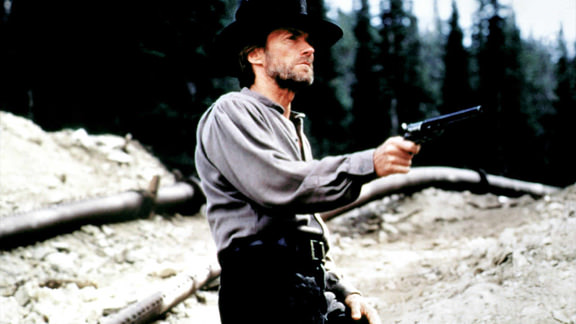The Outlaw Josey Wales
THE OUTLAW JOSEY WALES (1976) is about many things, I believe. What resonated most effectively with me was this insane notion of peace. The possibility of being in harmony with others, and oneself. The former may be possible for many but the latter is a daily struggle for many more. The latter also seems to be what drives man to dissatisfaction, to declare war on his neighbors, his brothers. War, in my opinion, has its basis primarly in a low self esteem that can be manifest as greed, disillusionment, lust, fear, and many other toxicities. Sin, basically.
Josey Wales lives on a farm with his family in the sort of domesticity we don't expect to see in Clint Eastwood characters. Then one day a group of Union renegade soliders (these are the last days of the Civil War) burns his life to the ground. A long scar on his face reminds Wales of all he has lost. Another day, another group of renegades (Southeners this time) show up to recruit him for vengeance. Vengeance for a lost war, but of course Josey has other scores to settle.
After a wearying tour, all but our antihero and a young upstart abandon the mission and saunter toward home, only to be slaughtered by the Union caderie. Surviving this ambush, Josey begins a long game of cat and mouse with the murderers, who post a hefty bounty on his head. Town after town from Missouri to Texas, Wales evades the worst of human motivations, usually manifest through the barrels of revolvers. What can a man beset by a war-centric land do but respond in kind?
This theme was explored by Eastwood many times. The DIRTY HARRY films were accused of being fascist as the protagonist ignored the Miranda rights of city vermin to mete out justice. The scum and villany are protected by what? Not in the Eastwood universe. As Josey, Clint presents another larger than life prescence who laconically empties the chambers, but also seems a bit more beaten down this time. With each disposal of enemy, he loses a bit more of who he once was. Perhaps the argument can be made for those who go off the deep end and commit unspeakable crimes; they are a product of a slaughterhouse of a world. So why doesn't everyone in that circumstance commit atrocities? What fine line prevents any of us from raping and pillaging? Or doing such in the name of "vengeance"?
War (civil or otherwise) calls off all societal bets. But who dares to rise against the tide?
Along his journey, Wales meets an elderly American Indian who had undoubtedly seen many a massacre and exploitation in the name of war and uh, colonization. This race is shown throughout the film to be tolerant and open to peace, yet ready to brandish violence if necessary. It is no wonder that Indians all but embraced this film, one of the first not to present them as tomahawk throwing hellions. There are lessons for all of us, here. I wish there were more examples of fiction of this caliber.
Or, the viewer can just enjoy the movie as a rich action and period piece. Bruce Surtees' photography helps to create very evocative Western atmosphere. Surtees would go on to lens other Eastwood Westerns, including the first of those I would see on the big screen, 1985's unsuccessful PALE RIDER. I remember gasping at how vivid were his visions, even with a lackluster screenplay.
Eastwood very ably directs this long but never dull tale.
Originally, writer Phillip Kaufman (THE RIGHT STUFF, THE WANDERERS) began to oversee, but Eastwood took over fairly quickly. And honestly, who else could direct this icon? Only a handful of other directors have attempted to direct the star since the 80s, with little success. I mean, who else could completely grasp the near mythology? What Eastwood does is all his own. Since the 1960s, the actor has steadily created a legion of men who rewrite the rules but are still subject to them. And mortal, too. THE OUTLAW JOSEY WALES would certainly make an interesting double bill with Eastwood's 1992 Western howl of pain, UNFORGIVEN. Is this "peace" I spoke of finally achieved at the end?



Comments